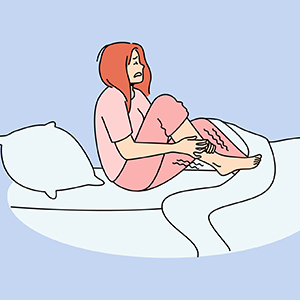Prevalence, risk factors and effects of restless legs syndrome in COPD patients

All claims expressed in this article are solely those of the authors and do not necessarily represent those of their affiliated organizations, or those of the publisher, the editors and the reviewers. Any product that may be evaluated in this article or claim that may be made by its manufacturer is not guaranteed or endorsed by the publisher.
Authors
Restless legs syndrome (RLS), a sensory motor disorder, is commonly seen amongst chronic obstructive pulmonary disease (COPD) patients. We conducted a study to know its prevalence in COPD and analyse the possible cause and effect of RLS. It is an analytical cross-sectional study conducted between July 2016-December 2020.The prevalence of RLS was evaluated in patients of COPD using RLS diagnostic criteria. Spirometry, iron profile and arterial blood gas analysis was performed in all the patients to evaluate the cause of RLS. The effect was evaluated with diagnostic criteria for insomnia and patient health questionnaire (PHQ2) for depression. There were 205 participants with a mean age of 59±8 years, 182 (88.7%) men and 23 (11.2%) women. The mean body mass index (BMI) was 29±3.9 kg/m2. The prevalence of RLS was 31.2%. RLS was more common amongst women compared to men (60.8% vs 27.4%). RLS was more prevalent among hypoxemic (PaO2<60 mm Hg) and hypercapnic (PaCO2>45 mm Hg) patients (p<0.016; p<0.017). The ROC curve plotted between PaO2 and RLS occurrence showed that the patients having PaO2 less than 76 mm of Hg were more prone to develop RLS. RLS patients had a higher incidence of insomnia as compared to those without RLS (68.8% vs 36.8%, p<0.001). COPD with RLS patients had more depressive symptoms with a higher patient health questionnaire 2 (PHQ2) score (35.9% vs 14.2%, p<0.001) compared to non-RLS COPD patients. The multiple regression analysis also confirmed that RLS led to insomnia and depressive symptoms in COPD patients. To conclude, RLS is common in COPD patients. RLS leads to insomnia and depression, thus should be identified and treated.
How to Cite

This work is licensed under a Creative Commons Attribution-NonCommercial 4.0 International License.






